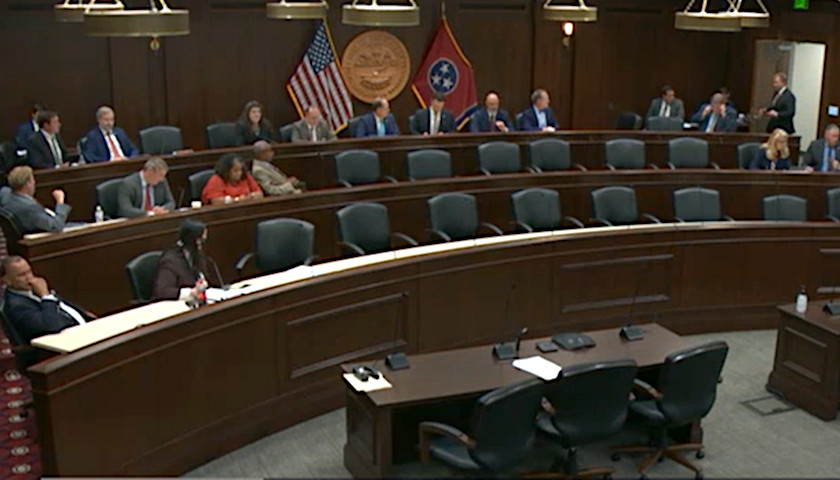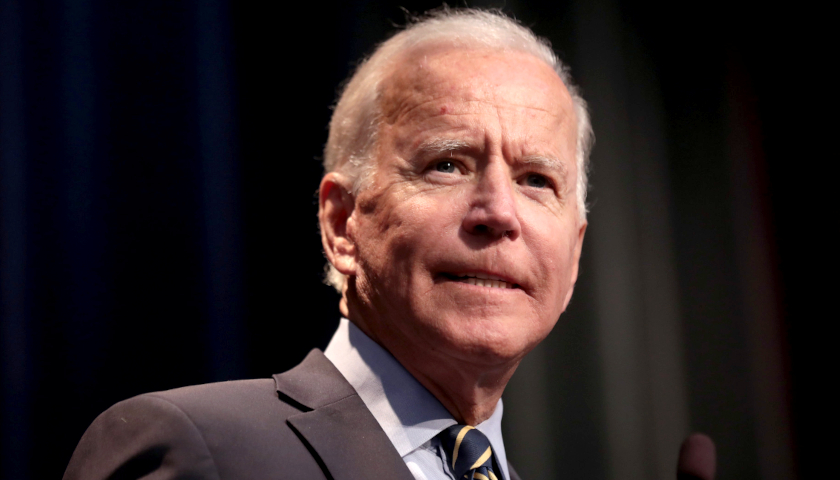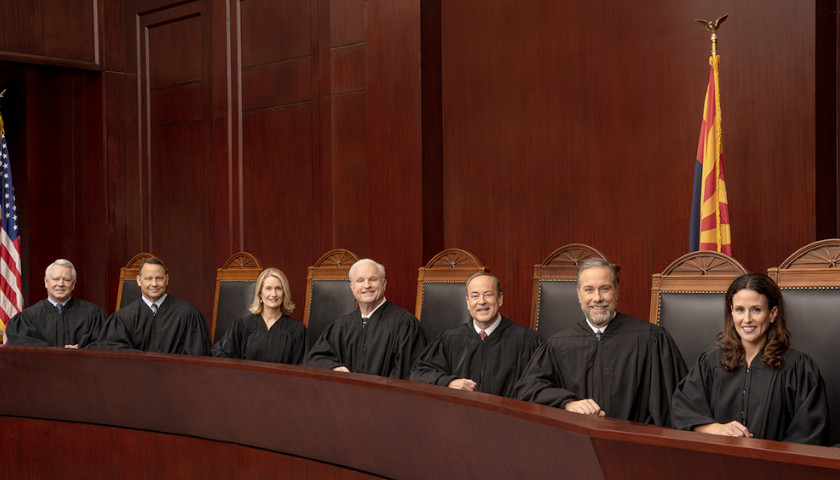The legislation that emerged in Saturday’s early morning hours from the three days of the 112th Tennessee General Assembly’s Third Extraordinary Session provided a number of safeguards against COVID-19 mandates, but some legislators say concessions to accommodate big business and funding from the federal government also resulted in unequal protection for some Tennesseans against COVID mandates.
Once the House and Senate had passed versions of the COVID protection omnibus bill through their respective committees by Friday morning and were scheduled to take up the measures during floor sessions later that day, reports emerged that Ford – which hasn’t even set up shop in the state – expressed concern to legislators that the legislation would prohibit companies from requiring masks.
Just the week prior, Ford was given during the Second Extraordinary Session of the 112th General Assembly $884 million in taxpayer funds for an electric truck building plant on the 4,100-acre Memphis Regional Megasite.
Subsequent to receiving Ford’s input, legislators removed from the final version of the legislation the prohibition of an employer requiring an employee to wear a mask as a condition of employment or taking adverse action against an employee for not wearing a mask or a private business requiring a person to wear a mask as a condition to access premises, facilities, products or services.
Additionally, when defining a governmental entity for the purposes of the prohibition of masks or proof of vaccination status, the legislation excludes a certified provider or healthcare provider enrolled in Medicare or Medicaid; any federal government entity; any assisted living facility, home for the aged, nursing home or residential hospice; or any airport authority.
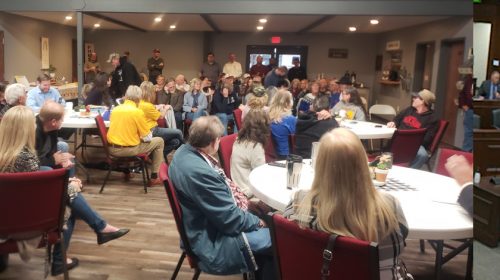
About 100 attendees of the Wilson County Conservative Republicans, organized by former Sen. Mae Beavers, listen as Sen. Mark Pody gives an update on the Second and Third Extraordinary Sessions of the 112th Tennessee General Assembly during which the $884 in taxpayer funding was given to Ford Motor Company for the electric truck building plant on the 4,100-acre Memphis Regional Megasite and COVID-related issues were taken up.
According to what Sen. Mark Pody (R-Lebanon) told about 100 attendees of the Wilson County Conservative Republicans Saturday morning, this will leave about 15 percent of Tennessee’s workforce without the protections against mandates other Tennesseans are afforded in the legislation.
As The Tennessee Star reported, the House and Senate versions of the “omnibus” bills, HB 9077 and SB 9014, respectively, were different in their original form as they passed through the various committees.
When the bills got to the floor and were amended, the Senate refused to concur with three House amendments and the House refused to recede from those same amendments, forcing a conference committee.
Senate conference committee members appointed by McNally were Senators Jack Johnson (R-Franklin), Mike Bell (R-Riceville), Bo Watson (R-Hixson), Paul Bailey (R-Cookeville), Dawn White (R-Murfreesboro), Raumesh Akbari (D-Memphis) and Jeff Yarbro (D-Nashville).
House conference committee members appointed by Sexton were Representatives Jason Zachary (R-Knoxville), Bryan Terry (R-Murfreesboro), Robin Smith (R-Hixson), Tim Rudd (R-Murfreesboro), William Lamberth (R-Portland), Chris Todd (R-Madison County), Bill Beck (D-Nashville) and Johnny Shaw (D-Bolivar).
Following several pages of definitions, the language of the conference committee report adopted by both chambers that will become a new Title 14 of the Tennessee Code Annotated (T.C.A.) added paragraphs 3, 4 and 5 to the findings of the General Assembly included in the original bills courtesy of an amendment by Rep. Bud Hulsey (R-Kingsport).
(1) Setting forth the rights of people in the context of COVID-19 restrictions in a statute assists the citizens of this state in the enforcement and protection of their rights and creates a safe harbor for those desiring to avoid litigation;
(2) Tennessee, as a great southern state within our federal system of government, is free to enact laws to protect the health and safety of its citizens under the police powers inherent to all states of a federal system of government;
(3) The United States Constitution does not prohibit the states from regulating health and medical practices, nor does it require any person to consent to any form of medical treatment, directly or indirectly, in relation to COVID-19;
(4) The right at common law to personal security and the liberty to be free from an unwanted touching of one’s limbs and body was retained by the people of this state, and that right includes rights and duties with respect to medical treatment administered by other persons, such as through COVID-19 vaccinations;
(5) Informed consent between patients and healthcare practitioners protects the rights at common law of persons and all such consent must be voluntary and not given under duress, coercion, misrepresentation, or fraud; and
(6) Consistent with our constitutionally recognized and inalienable right of liberty, every person within this state is and must remain free to choose or to decline to be vaccinated against COVID-19 without penalty or threat of penalty.
The purpose of Title 14, as the legislation states, is to “safeguard the constitutional rights and liberty interests of persons during the COVID-19 pandemic.” As such, Title 14 is to be constructed broadly to effectuate the purpose as described.
The legislation goes on to state that a governmental entity or public official may not suspend any provision of the title, regardless of a state of emergency.
The next sentence contradicts the statement, though, by allowing the governor to suspend any of the protections in the new section of law if he has declared a state of emergency – an issue many citizens and legislators, particularly those assigned last year to the Ad Hoc Committee on Emergency Powers who felt that T.C.A. 58-2-107 regarding emergency powers violated Article I, Section 1 and 2 in the state constitution relative to the separation of powers, that the governor overstepped T.C.A. 58-2-107 by deeming businesses and persons as essential and non-essential, or both.
Addressing one of the major concerns for Tennesseans, the legislation goes on to prohibit any governmental entity, school or LEA from mandating that a person receive a COVID-19 vaccine or that a private school or business require proof of vaccination as a condition to access facilities, products or services.
While a private business can require a COVID-19 vaccine of its employees and presumably its customers, it cannot compel a person to provide proof of vaccination.
While the legislation also prohibits an employer’s adverse action against an employee, combined with at-will employment the burden of proof of an adverse action regarding a COVID-19 vaccine lies with the employee.
In another work-related provision that was a new addition to the original legislation, an individual is allowed to require proof of vaccination as a condition of another person entering their personal residence for the purpose of providing products or services.
The legislation prohibits governmental entities from requiring masks for employees or as a condition for the public to access facilities, products or services unless the previously mentioned severe conditions exist and the mask requirement is in effect for no more than 14 days.
Masks cannot be required for schools unless “severe conditions” exist, the principal of an individual school submits a written request and the school board adopts a policy on a school-by-school or campus-by-campus basis. Even so, the mask policy can only be in place for 14 days and the school will have to provide N95 equivalent masks for persons 12 and older and age-appropriate masks that offer similar protection for those between the ages of 5 and 12 as well as reasonable ADA accommodations.
For the purposes of the legislation, the term “severe conditions” is defined as a COVID-19 state of emergency declared by the governor and a COVID-19 infection rate of at least 1,000 new known infections per 100,000 residents of the county over a rolling 14-day period.
A provision new from the original version concerns entertainment venues – otherwise defined in state law as theaters, stadiums, museums, arenas, amphitheaters, racetracks or other places where performances, concerts, exhibits, games, athletic events or contests are held – that require a negative COVID-19 test to gain admission, and allows the attendee to provide proof of vaccination or COVID-19 antibodies as an alternative.
Many of these entertainment venues have or continue to receive taxpayer funding or fall under the oversight of a quasi-governmental agency such as a sports authority, yet are not considered as one of the the entities prohibited from inquiring into personal health information.
In the original legislation, any private business found to have violated the vaccine and mask provisions and to have received state funding by way of state grants or state tax credits in the fiscal year the violation occurred would have been ineligible for state funding for the next two fiscal years. That provision was removed from the final version.
Meanwhile, legislators gave businesses COVID-related liability immunity in a special session conducted last year that was described as sweeping and historic and will be incorporated into the new Title 14.
An anti-commandeering provision prohibits the use of funds, personnel or property of the state or any political subdivision from being used to implement, regulate or enforce any federal law, executive order, rule or regulation that mandates “the administration of a COVID-19 countermeasure.”
An exemption to any provision relative to vaccine and mask mandates is available to private businesses, governmental entities, schools or employers, if necessary to continue to receive federal funds for contracts or grants.
The establishment of the guidelines and review of the submission for the exemption will be handled by the state’s comptroller of the treasury and will be renewable for an additional calendar year from the date the comptroller gives the exemption.
The sole authority to determine quarantine guidelines is now assigned to the Commissioner of the Department of Health.
Other significant provisions included in the legislation that afford protections to individual citizens include:
- The availability of unemployment benefits not only prospectively but retroactively to those employees who left their employment voluntarily or involuntary due to their employer’s COVID-19 vaccine requirement.
- Any person injured as a result of violations of the portion of the legislation that prohibits vaccine or mask mandates is entitled to a private right of action for injunctive relief and to recover compensatory damages and reasonable attorneys’ fees.
- In a move against the misapplied mature minor doctrine, COVID-19 vaccines shall not be administered to a minor by a healthcare provider without written consent from a parent or guardian.
- The recommendation, prescription, offering or administering of monoclonal antibodies to a patient for treatment of or prophylactically against COVID-19 shall be left to the healthcare provider exercising their independent professional judgement.
- An addition to the final version protects health providers from a disciplinary process or action by a health-related board for dispensing or prescribing medication for COVID-19 unless promulgated as a rule.
- A hospital shall not restrict a patient from having at least one family member present during the hospital stay, provided that the family member tests negative for COVID-19 and is not exhibiting symptoms of COVID-19 or another virus or communicable disease.
The legislation that will go into effect upon becoming law – which is when the governor signs it into law or in 10 days, excluding Sundays, if he does not sign it – terminates on July 1, 2023, with the exception of the liability immunity for businesses.
Of the more than 80 bills filed in the House and Senate that covered all the topics and more in the final bills, it was just eight pieces of legislation sponsored by Senate Speaker Randy McNally (R-Oak Ridge) and Speaker of the House Cameron Sexton (R-Crossville) that went on to passage.
Overviews of the Speakers’ other seven measures passed during the Third Extraordinary Session follow.
SB 9007 – Makes appropriations relative to the special session.
SB 9008 – Allows the attorney general to petition the court and a court to appoint a pro tem district attorney if they peremptorily and categorically refuse to prosecute all instances of a criminal offense without regard to facts or circumstances. As The Star reported, this legislation could affect Nashville District Attorney Glenn Funk, who has said he refuses to enforce laws passed by the General Assembly for marijuana possession and transgender bathroom signs, for example.
HB 9072 – Allows a county political party to call for a partisan primary for school board elections, which are currently non-partisan. This legislation would help voters distinguish party platforms that support school curriculum related to topics such as Critical Race Theory, for instance.
HB 9073 – As presented by the sponsors, this bill will allow banks to accept the large amounts of cash being distributed by the federal government in conjunction with COVID relief.
HB 9075 – Decreases the period of time that a state of emergency declared by the governor may continue from 60 days to 45 days. There was a separate bill that would have reduced the period the governor could declare a state of emergency from 60 days to 21 days and would have required the legislature to authorize any extension via joint resolution and prohibit the governor from shutting down businesses, restricting citizens freedom to travel and assemble or expend funds without approval by the General Assembly. The House bill HB 9029 sponsored by Rep. Debra Moody (R-Covington) passed the House COVID-19 Committee on Thursday, but the companion SB 9024 sponsored by Pody failed in the Senate State and Local Government Committee for lack of a motion for the bill to be heard.
HB 9076 – Upon declaration of a pandemic with the WHO and subsequent declaration of a state of emergency by the governor and until the pandemic ceases to exist, gives the governor the exclusive jurisdiction to issue executive orders and directives with respect to every county health department. This bill, which also had to go to a separate conference committee to reconcile differences between the House and Senate versions, will bring consistency between the 89 health departments that fall under the state and the 6 independent health departments in Nashville-Davidson County, Hamilton County, Knox County, Madison County, Shelby County and Sullivan County, by giving the power to the governor.
SJR 9005 – A Senate and House joint resolution brought by Rep. John Ragan (R-Oak Ridge) condemns any attempt by the federal government to penalize Tennesseans in an effort to enforce unconstitutional mandates regarding COVID-19 vaccinations and other restrictions and requirements, recognizes the right of the General Assembly to enact legislation to nullify actions by the federal government that violate the U.S. Constitution and urges the attorney general to take appropriate civil action or appropriate relief for any federal vaccine or routine testing mandate.
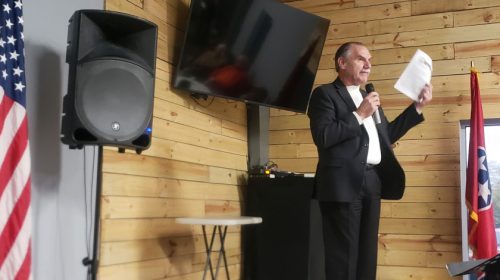
Sen. Mark Pody, who sponsored 27 bills during the Third Extraordinary Session of the 112th Tennessee General Assembly to address COVID-related issues, expressed hope that when the legislature returns in January additional legislation would be passed to protect all Tennesseans.
The Third Extraordinary Session of the 112th Tennessee General Assembly concluded in the early morning hours of on Saturday, October 30.
As Pody, who filed 27 bills, told the conservative group that the legislature came into session on this past Wednesday with nothing protecting Tennesseans from vaccinations.
“Sure we have our constitution. Sure we have our freedoms. Sure we have our rights. But, they were just being trampled on by everybody.”
When they go back into session in January, Pody expressed hope that legislation will be taken up so that the rest of Tennesseans can be protected.
The details and videos related to the legislation filed for the third special session can be viewed by selecting the appropriate legislation found here.
– – –
Laura Baigert is a senior reporter at The Star News Network, where she covers stories for The Tennessee Star and The Georgia Star News.

